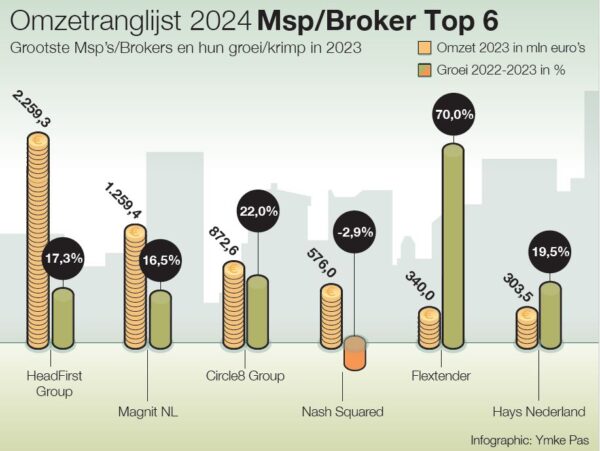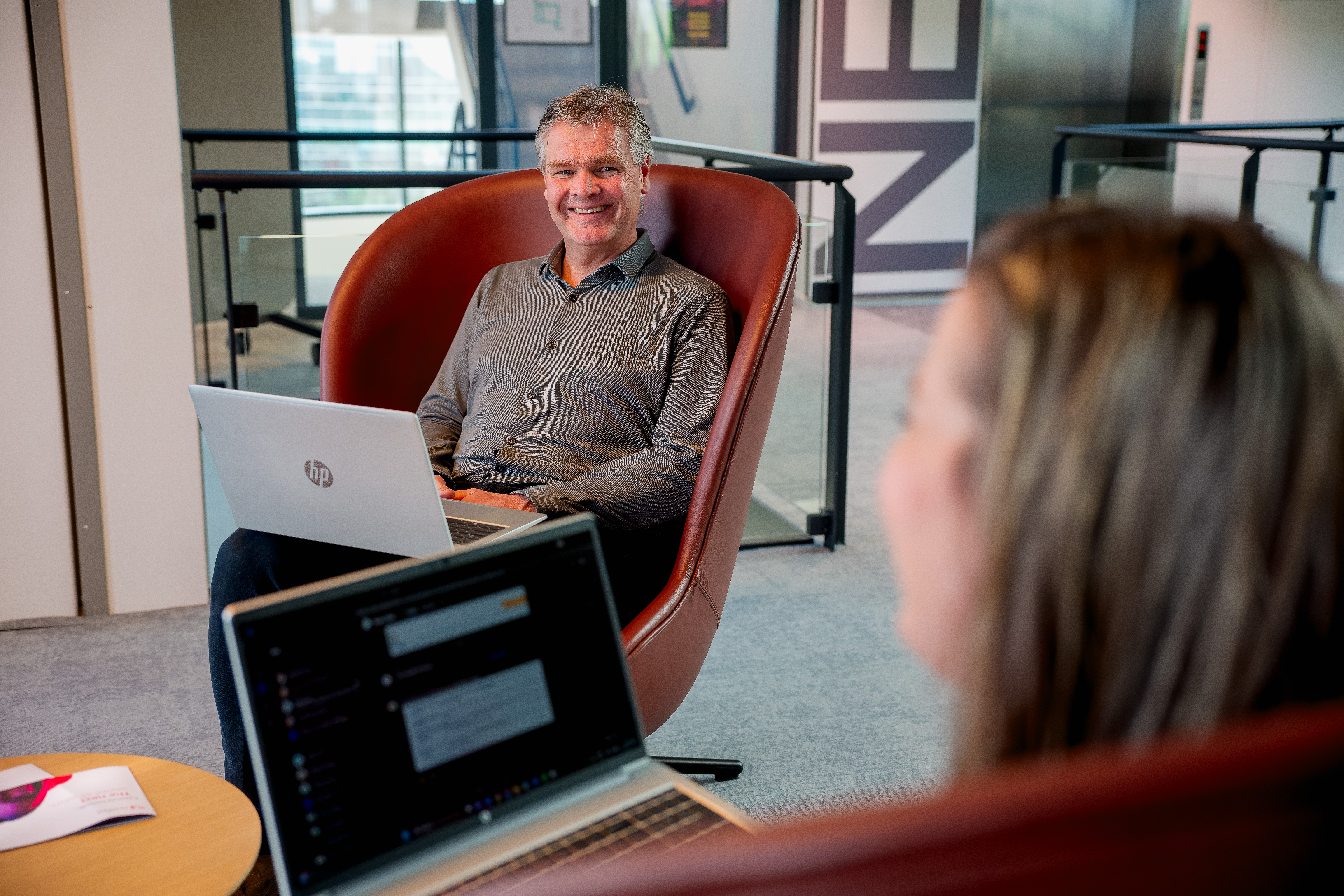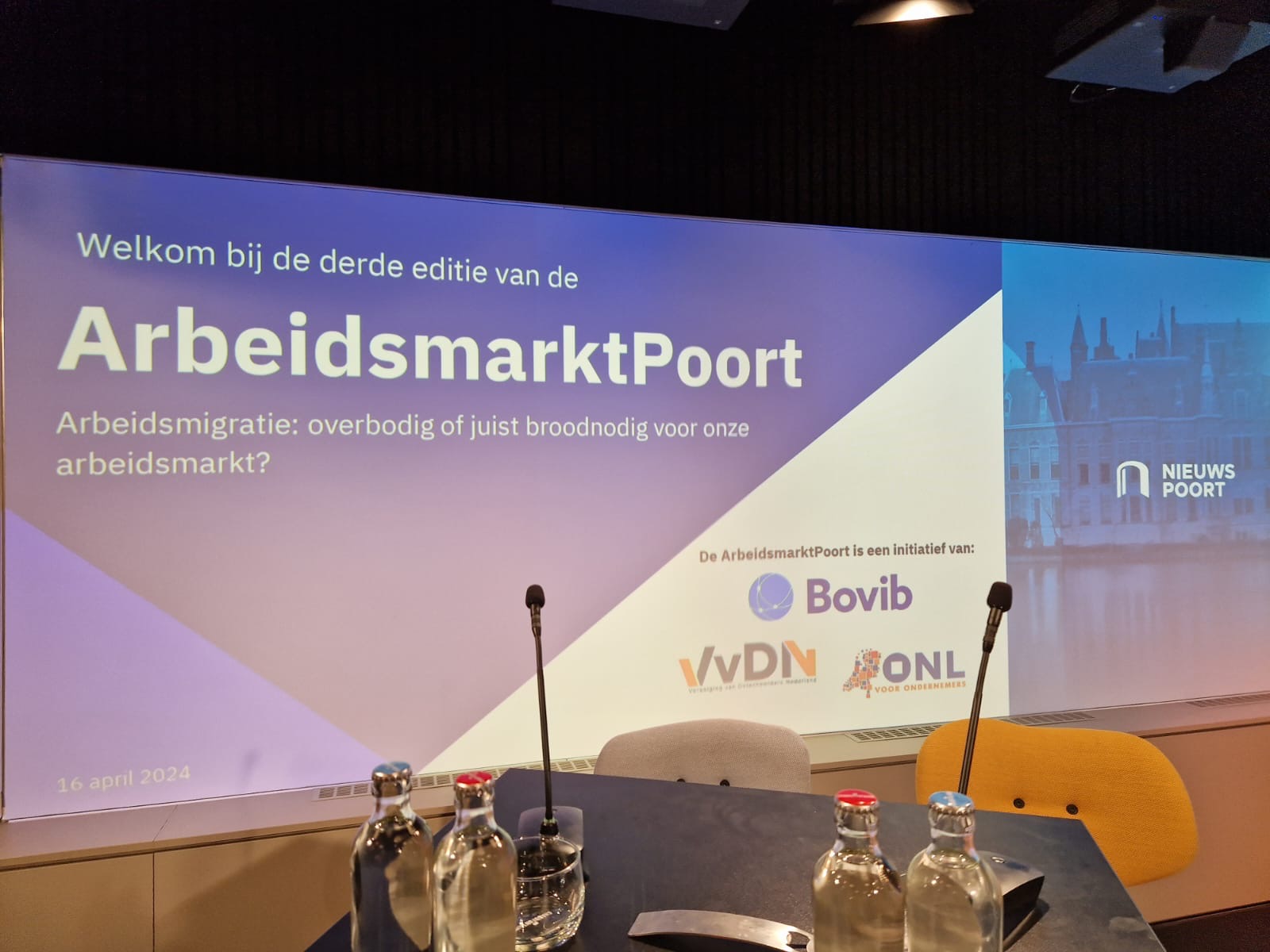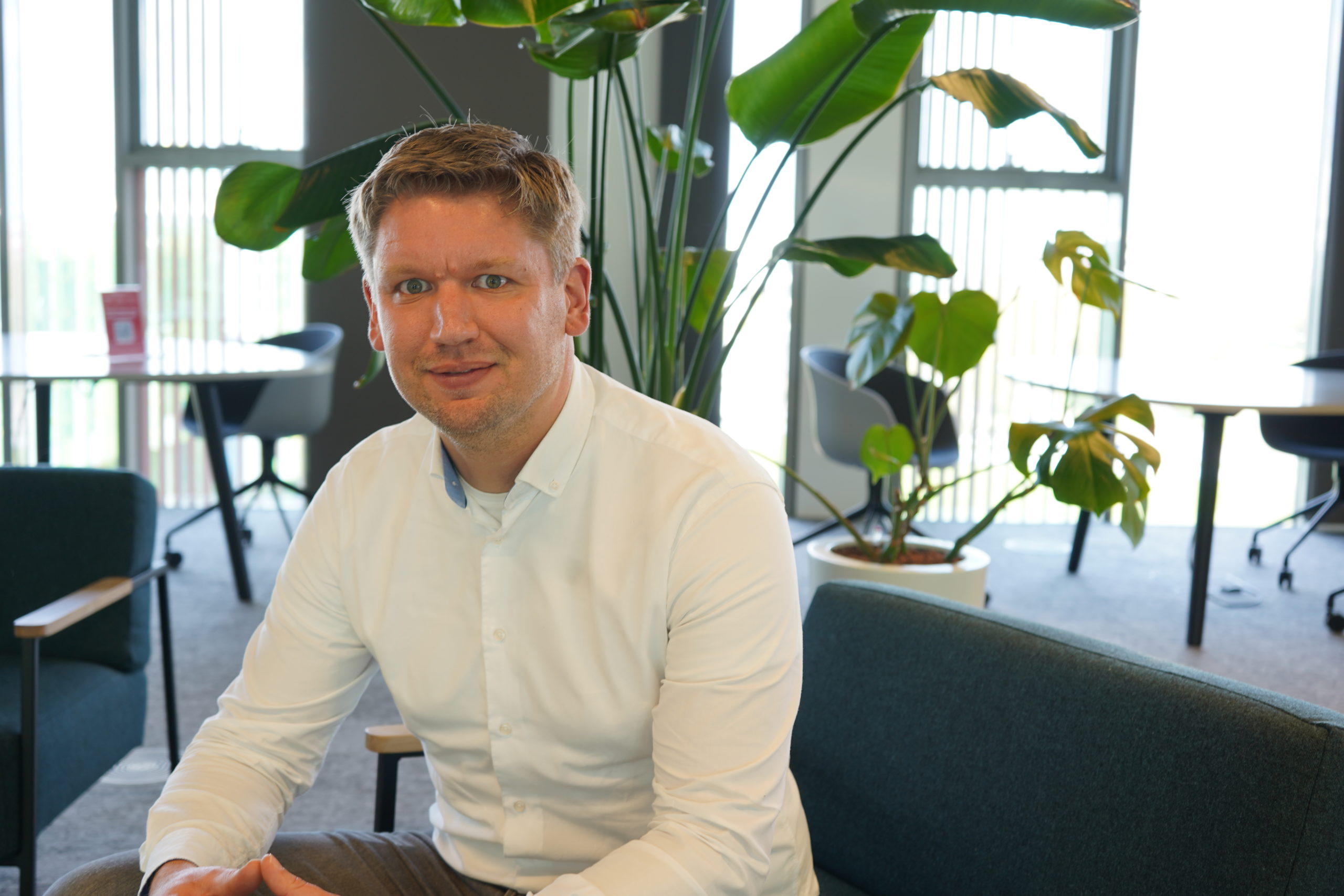HeadFirst Group introduces Striive: revolutionizing the flex market
Striive takes its place as the largest and most user-friendly assignment platform in the Benelux region
HR-tech service provider HeadFirst Group launches assignments platform Striive, the largest and most user-friendly in the Benelux. Striive helps professionals find new challenges, supports suppliers in matching assignments with their talent and assists clients in their search for the best candidates. The platform is revolutionary in ease of use and uniquely uses artificial intelligence (AI) to connect supply and demand. In addition, Striive offers innovative services to fully support professionals in their entrepreneurship.
Connector between tech and touch
HeadFirst Group believes in - and fights for - a fair, open job market where technology and human touch go hand in hand. In this "next world of work," Striive takes the position of excellent connector. Every year, the platform brings together more than twenty thousand assignments at over five hundred leading organizations in one place. In doing so, it offers easily accessible new career opportunities for professionals, self-employed or employed by suppliers.
Mattijs Wassenburg, Managing Director Digital at HeadFirst Group, explains: "Our goal with Striive is to make all assignments in the market available in one online place for all professionals, regardless of contract form. Ease of use is hugely important in this regard. We rebuilt the platform from the ground up, based on thousands of reviews, user interviews and data analysis. Independent professionals and suppliers on our platform have four primary needs: 1) challenging assignments with reputable clients, 2) minimal red tape, 3) prompt payment of invoices, and 4) personal contact when they want it. Striive fulfills the first three needs, giving my colleagues more time for the fourth: the human touch."
Innovating on top of powerful foundation
Striive occupies a unique position within the Benelux flex market, but its ambitions extend further. HeadFirst Group recently joined forces with Impellam, which offers global opportunities. Wassenburg comments, "Striive is easily scalable to other countries, which does not take away from the fact that the main focus of my product team is now on further innovation on top of the strong foundation. Our ambitious goal is for users to be able to complete the contract process in Striive within 15 minutes on a mobile device. We have already reduced the run time by more than 50%, but we will keep going until we achieve our goal."
In addition, Wassenburg is working on the best matching service based on AI, combined with the expertise of HeadFirst Group's experienced recruiters. "We already have a user-friendly benchmarking tool that allows professionals to compare their value with peers. Soon we will add an AI-driven resume checker that performs a fit-gap analysis between the resume and the assignment. These innovations, along with various insurance and personal development tools, among others, fully support professionals in their entrepreneurship so they can focus on their assignment."
Curious about the new Striive platform? Visit striive.com.
Compulsory disability insurance bill in Internet consultation
Outgoing Minister Van Gennip (SZW) earlier this week launched the Basic Disability Insurance for Self-Employed Workers Act (BAZ) into Internet consultation. The BAZ originated from a proposal by the Labor Foundation and is part of a broader labor market reform package. Lengthy negotiations took place on the desirability, feasibility and criteria of this disability insurance for the self-employed. Van Gennip has now decided to take the next step in the process by putting the bill into Internet consultation so that stakeholders, market participants and self-employed organizations can provide their feedback.
The AOV is based on three principles: affordability, comprehensibility and enforceability. The law is designed as follows:
- The new insurance will be mandatory for all self-employed people who enjoy "profits from business" for income tax purposes.
- Self-employed people who have been sick for a year (called the waiting period) may be eligible for disability benefits.
- Self-employed people receive this benefit if they are no longer able to earn the minimum wage due to illness. This is different from workers' compensation insurance, which looks not only at what a person is still able to do, but also at what a person previously earned.
- The benefit amounts to 70% of earnings before disability, up to a maximum of the minimum wage. This benefit continues until the state pension age.
- Self-employed people pay about 6.5% of their business profits in premiums, with a maximum of about €195 per month, based on the 2024 minimum wage. The premium is tax deductible.
- Self-employed persons who find this safety net insufficient, prefer private insurance or already have disability insurance can opt out. The private insurance must meet a number of minimum conditions: the disability benefit may not be lower than that of the public insurance, the premium must be at least equal to that of the public insurance, and the insurance must continue until the state pension age. There will be transitional law for existing insurance.
HeadFirst Group is pleased with the possibility in the current bill to take out private insurance for themselves. In previous conversations with stakeholders and in our external communications, we have emphasized that self-employed people value this opt-out. It is positive to see that Van Gennip and her policy staff have taken this into account.
Interested parties can comment on the bill here until July 23, 2024. After that, all reactions will be analyzed and, where necessary, incorporated into adjustments. The bill will then go to the Council of State and will then be debated in the House of Representatives.
'There's no way half of self-employed people are sham self-employed'
Recently the Financieele Dagblad paid attention to the abolition of the enforcement moratorium and the fiscal and employment risks for zzp'ers and clients. These concerns are justified, because also at HeadFirst Group we notice an increasing number of questions from clients about this issue. Labor law and tax are significant risks, so good information is crucial. At the same time, we need to keep the peace, support each other, keep hiring genuine self-employed workers and encourage compliant behavior. I noticed in the FD article that there are misunderstandings about the number of false self-employed and that wrong figures are presented. As the CEO of an HR-tech service provider, I feel compelled to respond based on facts and objective research. This is because the claim that "half of all self-employed people may be a false self-employed person" is unfounded.
Dutch politicians and politicians have been working for quite some time on policies to make a clearer distinction between employees and the self-employed. It is important to conduct this discussion on the basis of facts and figures, because only then can we together arrive at feasible policies that really work. We contribute to this discussion by conducting research with partners such as ZiPconomy, ONL for Entrepreneurs and SEO Economic Research.
Facts and figures on self-employed population
In our recently published 'Grip op het zzp-dossier' we describe the zzp-population working in the Netherlands. This group is heterogeneous, diverse and active in the labor market in all shapes and sizes. Based on these figures, I can tell you one thing: it is impossible that half are sham self-employed. Of the approximately 1.2 million self-employed in the labor market, over 270,000 sell products. By definition, these fall off as sham self-employed. In addition, a large group of self-employed workers, about 329,000, offer their labor to individuals. They also fall off as sham self-employed.
Zooming in further on the self-employed who offer labor to organizations, we see a large group that has many clients per year and does short-term assignments. This group is actually growing compared to the group doing longer assignments with few clients per year. In 2023, 65% of the self-employed who provide their own labor had more than four clients per year. In 2021, this percentage was still at 58%. That leaves about 210,000, which is about 17.35% of the total. Even in this group, not everyone is a sham self-employed person.
In addition, I continue to be puzzled by the discussion about the sustainability and affordability of the social security system. Earlier we commissioned SEO Economic Research to map the social and economic value of independent professionals (those who fall into the category with fewer clients per year). The figures do not lie: government, business and workers themselves all see positive results. Although less premiums are paid, this is more than offset by higher tax revenues.
Road to a workable solution
Finally, I am aware of the different interests and perspectives regarding the self-employed dossier. At the same time, surveys show time and again that the majority of self-employed people choose entrepreneurship very consciously, are satisfied with their working conditions and are happy to dedicate themselves to the Dutch labor market and economy. Although there are free birds and outlaws among them, it does not help to state that half of them are pseudo self-employed; this does not contribute to a constructive discussion or workable solution. The legal presumption of employment below an hourly rate of €32.24 is an excellent proposal to better position vulnerable workers at the base of the labor market. In an earlier opinion piece I already called for the bill 'clarification of assessment of labor relations and legal presumption' to be cut up and for the legal presumption to be dealt with quickly in the Lower House. After all, there is broad support for it in both the polder and the field. In addition, we must sit down together to formulate clear entrepreneurial criteria, so that self-employed workers and clients get the clarity and recognition they deserve.
HeadFirst Group strengthens second place in Flex Market Revenue Ranking 2024 with impressive organic revenue growth
In 2024, HeadFirst Group once again captured the second position in the renowned Flexmarkt Turnover Ranking Top-100. The HR-tech service provider achieved revenue growth of €333.3 million in the Netherlands during the year 2023, entirely organically.
For the year 2022, HeadFirst Group recorded a Dutch turnover of €1.93 billion. In 2023, this rose to €2.26 billion, a growth of more than 17%. In addition, there was a nice increase in employee satisfaction of almost 10%, an achievement that says a lot about the organization's vibrant work culture and its commitment to growing talent. Equally important is the increase in satisfaction among clients, suppliers and independent professionals, with 31 points in the NPS.
CEO Marion van Happen: "We set ambitious goals for 2023, driven by our core values. I am immensely proud that we have not only met but exceeded these goals. This underlines our determination to not only meet expectations, but to rise above them. Our team's passion, drive and effort drive our performance. This makes us leaders in HR tech services in thought leadership, talent intelligence and innovation."
Van Happen continues: "In 2024, we will continue our existing strategy. We want to realize our vision of being technology agnostic for all our stakeholders, with our platforms Striive, ProUnity and OpenTalent at the center. By making smart use of automation and AI, we can further digitize the end-to-end process so that we can add our personal touch at the moments when it really adds value. Beyond our core business, we are taking the lead in moving toward a just, diverse and inclusive labor market. We are building an even more sustainable organization so that we can provide value to the society around us. Our ambition is to be the first HR tech company to become Bcorp certified this year."
All annual figures
Earlier this year, HeadFirst Group presented its annual figures, including international divisions, with a record turnover of 2.6 billion. This is a fully organic growth of 21% compared to 2022. The annual report of HeadFirst Group can be read and downloaded from the Investor relations page.
About Flexmarkt Turnover Ranking Top-100
The Flexmarkt Turnover Ranking Top-100 is a leading ranking of flex companies, from small to large, offering a variety of services in staffing and hiring. In addition to staffing agencies, it includes numerous payroll companies, as well as secondment companies, zzp intermediaries and MSP service providers. The list is published annually by Flexmarkt in cooperation with Corporate Finance International (CFI). In terms of turnover, it covers more than half of the total Dutch flex industry and thus provides a clear, representative picture of developments in the market.
Success of female self-employed surpasses men in labor market
The latest Talent Monitor, a joint study by labor market data specialist Intelligence Group and HR-tech service provider HeadFirst Group, shows that female professionals - self-employed or employed by suppliers - are 68 percent more successful in obtaining assignments than their male counterparts. Moreover, the data analysis shows that female self-employed professionals no longer have a gender pay gap in hourly rates, whereas this was still the case before the corona pandemic.
Missed opportunity for recruiters
Despite the success of female professionals in winning assignments, they are less actively approached by recruiters than men. The analysis shows that, on average, men are approached one-third more often than women. Among independent professionals, this is just under 19 times per year among men versus nearly 15 times per year among women. Among employed workers, this happens more than 10 times a year versus nearly seven times a year.
Geert-Jan Waasdorp, director and founder of Intelligence Group, says: "Men are more likely to work full-time and are therefore attractive to recruiters. This could be financially driven, as more hours also means more turnover for a recruitment agency. In addition, a possible factor is that LinkedIn, one of the main sourcing channels, is slightly over-represented by men."
Marion van Happen, CEO of HeadFirst Group, adds: "This surprising insight highlights the importance of measuring effective recruitment efforts. Gut feeling no longer represents market dynamics. Organizations that get their numbers, both internal and external, right are demonstrably more successful in placement, growth and profitability."
Gender equality in hourly rates
Where exactly there is no difference between male and female professionals is in the hourly rate. The rates have converged significantly over the past six years. Up to and including the first quarter of 2020, this difference was 10.3 percent, but after this corona period, the difference has become minimal and moreover not explanatory on the basis of gender. This is in contrast to other segments of the market or contract types where this is still the case. Of course, factors such as work experience, field and education level still play a role in explaining differences in rates.
"This groundbreaking result from our data analysis points to a promising development: there is no longer a gender pay gap between male and female professionals. This represents a crucial step toward a just and equal labor market for all. It is an inspiring goal to which we, together with our rapidly growing ecosystem, are striving," Van Happen concludes.
The Talent Monitor provides valuable insights into labor market movements and gender dynamics in the job market. The full report is available for free download at headfirst.group.
From raw data to customer insights: Ton Sluiter and Peter Ellen lead the way at HeadFirst Group
In the dynamic environment of HeadFirst Group, Ton Sluiter, Manager of Data, and Peter Ellen, Journey Manager on the Customer Experience (CX) team, are at the helm of an evolution towards a future driven by data and customer experience. Their shared passion for the power of data and customer experience serves as the driving force behind their continuous pursuit of improvement and innovation.
Valuable insights
Ton enthusiastically begins by explaining the role of the data team, "We dive into all incoming data and turn it into valuable insights. Whether it's generating reports for our customers and partners, or internal information for management, our goal is to optimize operations both internally and externally."
Peter adds, "My job is to collect and analyze customer feedback. Based on that analysis, I can identify the biggest impact on how people experience our company, and work to improve." Although Peter has not been with HeadFirst Group long, he shares some successes, "I am especially proud of how quickly we have established a foundation and structure for measuring what clients think of us. This is essential because it forms the basis for improving the customer experience for the future."
"We share our passion for the power of data and customer experiences." - Ton Sluiter
Foundation for the future
Ton is optimistic about the future of data-driven work, but acknowledges that there is still room for growth: "We are currently in the data analytics phase and moving toward predictive analytics and models that help with future business decision-making. We aim to generate more insights and become truly data-driven in all our processes." Peter acknowledges this growth, having come at a time when there was no CX team. "In the beginning, the whole CX Journey Management was a blank page: nothing was fixed. It was a period of pioneering and discovering what I could add."
"It's great to see how fast we're growing, with the ability to innovate quickly." - Peter Ellen
That immediately made it interesting for me, the feeling of a blank canvas. As time went on, a clearer picture emerged of what I could contribute. CX is now rolled out for all HeadFirst Group brands."
Innovation & growth
When asked what makes his work so fascinating, Ton responds enthusiastically. "Working with data is actually similar to refining: raw data comes in, is processed and eventually leads to valuable insights. We not only collect data for its original purpose, but also discover unexpected applications. We call this serendipity. I get energized when we can take clients or ourselves further with it!"
Peter shares Ton's enthusiasm: "It's great to see how fast we are growing but still have the ability to innovate quickly. I really appreciate that drive. Our shared commitment to unlock the potential of data and improve the customer experience reflects the energy of HeadFirst Group."
Want to read more about how we operate at HeadFirst Group? Download the 2023 annual report here.
New bill introduces admissions system: what does it mean?
A new bill, the Law on the Admission of the Supply of Workers (WTTA), will begin to be debated in the House of Representatives this year. This proposal brings with it an admission system for temporary employment agencies and other companies that make workers available to a third party to work under its management and supervision. The scope of the law is thus considerably broader than just the temporary employment sector. What exactly does it entail and what impact will it have on suppliers and clients?
The new regime requires that lenders be allowed to operate in the market only if they are authorized to do so under a new regime. To be admitted, they must meet several conditions:
- The company meets the standards framework by means of an approved inspection report provided by an inspection body designated by the Minister (article 12q Waadi);
- A Certificate of Good Conduct for legal entities is provided (Article 12o Waadi);
- The company deposits a deposit of €100,000 (Article 12p Waadi).
Hirers using temporary employment, secondment or payroll agencies, the so-called lenders, may only do business with agencies that have been admitted to the system by the Minister of Social Affairs and Employment. The Dutch Labor Inspectorate will supervise whether in- and on-borrowers actually work with authorized lenders and whether the lenders are authorized. Failure to comply with applicable laws and regulations can result in hefty fines, both for hirers, and hirers.
Transitional regime
The bill also provides for transitional law to encourage hirers - in the run-up to the entry into force of the obligation of admission on January 1, 2026 - to apply for admission no later than June 30, 2025, who already possess an SNA seal of approval. Companies that already have this seal of approval will be admitted on the basis of the SNA seal of approval, even if they have not yet been actually inspected on the basis of the new standards framework.
Implications for in- and out-workers
For suppliers who engage in the provision of labor, this bill represents a significant change in the way they operate. To remain active in the market, they will have to be admitted to this public system. Lenders will be audited periodically (probably twice a year) on the standards framework. This therefore requires compliance with laws and regulations, as well as the necessary investment in time and resources to meet all requirements. In- and on-lenders will be prohibited from doing business with lenders who are not admitted to the system. There will be a public register to verify that the hirer is actually admitted to the system.
In essence, the WTTA will change the dynamics of the Dutch labor market, with the goal of improving the position of migrant workers, keeping rogue broadcasters out of the labor market, and thus ensuring a level playing field for all buyers and sellers. It is important for both suppliers and clients to be well informed about developments regarding the WTTA. Needless to say, we at HeadFirst Group are preparing in a timely and adequate manner so that we can continue to provide our services.
TechMeUp's mission: diversity in the tech world
Creating a more diverse and inclusive tech ecosystem is the mission of TechMeUp. Despite the fact that many people are eager to improve their skills and retrain to become tech professionals, not everyone has the financial means to do so. That's why TechMeUp offers interest-free loans to motivated students, giving more people access to a tech education.
Saskia Verstege, Interim Director of TechMeUp, says, "We partner with seventeen IT training providers. When students enroll in a tech course and realize it will be financially challenging, the training providers refer them to TechMeUp. When we look at the demographics of the students we help, the average age is 34, almost 60% are women, and about 80% are from immigrant backgrounds.
"Almost 60% of our students are women, and about 80% are from immigrant backgrounds." - Saskia Verstege
"We offer interest-free loans to students with an average of €4,500, depending on their needs. This loan can be used to cover the cost of the course itself, as well as living expenses during the course. For many people, finances are an obstacle to (re)starting their studies, as they may have to work less or not at all, while still paying their mortgage or rent. With the help of a loan from TechMeUp, these financial concerns are alleviated. After completing their education and finding a job, they gradually repay the loan amount in installments. With the money repaid, we help new students retrain."
Results
HeadFirst Group supports TechMeUp with a financial contribution. Thanks to this contribution, eleven students received TechMeUp student loans in 2023. Nine of the students are still studying, and two students have since graduated. In addition to the achievements made possible by HeadFirst Group's contribution, TechMeUp helped another 140 students last year with an interest-free loan. "Besides making the tech world more diverse, our work also contributes to students' financial self-sufficiency. The average salary of students before receiving a loan is €1,100, and the average salary after completing a tech training program is €2,884."
Future
"By 2024, we aim to help two hundred students with loans. In addition, we are committed to helping everyone get a job after graduation." TechMeUp's interest-free loans allow more people to access tech education and contribute to a more diverse and inclusive tech ecosystem.
"We aim to help two hundred students by 2024, with 'a job for everyone' as our main goal."
Want to read more about how we at HeadFirst Group contribute to diversity, inclusion and other social issues? Download the 2023 Annual Report here.
Successful third edition of the Labor Market Gateway
On Tuesday, April 16, the third edition of the ArbeidsmarktPoort took place in Nieuwspoort, organized by the Bovib, the VvDN and ONL voor Ondernemers. This meeting brought together various speakers to discuss current labor market issues with each other and the audience. The central theme of this edition was labor migration, a topic that is high on the political agenda and on which opinions vary widely. It was therefore relevant to exchange ideas and discuss positions with stakeholders.
Former ChristenUnie party leader Gert-Jan Segers provided the opening remarks and explained the Delta Plan Grip op Arbeidsmigratie. Gert-Jan recently started as strategic advisor at OTTO Work Force and contributes to the public-societal debate on labor migration and the consequences for the Dutch labor market and society with such reports. The opening remarks and questions from the audience were followed by a discussion panel. Tjebbe van Oostenbruggen (Member of Parliament NSC) and Titus Kramer (entrepreneur and former honorary consul for Turkey) entered into a discussion with each other and the audience, led by Hans Biesheuvel (former chairman of ONL). The discussion generated interesting questions from the audience, especially about the NSC's position on labor migration, with the party making demands on terms and conditions of employment, conditions and housing for migrant workers. NSC also advocates an admission system to keep out rogue employment agencies, which in turn led to critical questions about the feasibility and enforcement of the proposed legislation.
In October, the fourth edition of the Labor Market Gate is planned, where interesting speakers are again expected. HeadFirst Group supports this initiative and is in favor of a constructive, factual debate on issues and challenges in the Dutch labor market. We remain committed to these meetings and look forward to the next edition.
Do you have questions about the Labor Market Gateway and our position in the labor market file? Please contact Sem Overduin, Manager Corporate Affairs & Public Policy at HeadFirst Group, at Sem.Overduin@headfirst.nl.
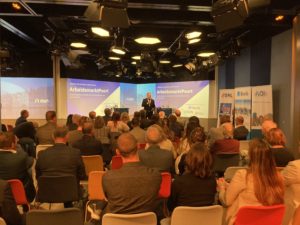
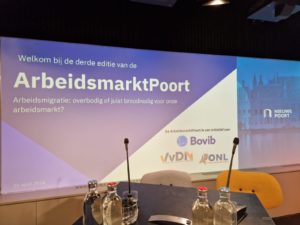
Digitizing for more user-centricity and shorter processes
Within HeadFirst Group, we started an important behind-the-scenes project last year: a completely revamped, digital onboarding of professionals as soon as they start working for our clients. In collaboration with screening platform Victoria ID, we are working on a faster and smarter way to conduct screenings - an important, but also time-intensive, part of onboarding. Gerjan Pranger, operations director at HeadFirst Group: "By further digitizing the process, we are creating space to give personal attention to our professionals and partners at the times when it really adds value for them."
Founder and CEO of Victoria ID, Stéphanie Eikhoudt: "With Victoria ID, we want to introduce a new validation method. Together with HeadFirst Group, we are working to reduce screening turnaround times by automating the process as much as possible. For example, we use validated ID data for simultaneous checks, which results in faster results and ensures the reliability of the information."
Accelerating processes with AI cross-check technique
Stéphanie discusses this method passionately and enthusiastically. "With our updated AI cross-check technique, we are taking data validation to the next level, where our software reads authenticity attributes faster and more accurately than ever before. This allows us to significantly speed up the screening process for all HeadFirst Group clients. We maintain high quality standards in validation processes, focusing on efficiency, ease of use and customization."
Gerjan Pranger, operations director at HeadFirst Group, is leading this multidisciplinary project. "Instead of carrying out screenings ourselves, it makes much more sense to have this done by a specialized party. Victoria ID is not just a supplier, but really a partner. We develop, test, gather information and together build the best workflow. It is a very intensive collaboration that contributes to further development for both organizations."
"Developments go as fast as they can, but as slow as they have to." - Gerjan Pranger
Building bridges together
Gerjan continues: "We strive to create a fully digital workflow and shorter processing times. That is one of our project management principles. After the testing phase and a successful pilot with Rabobank, it is now time to address process challenges. For example, what is technically smartest, but more importantly, what works best for the user? Everything has to be aligned, which takes time and attention. We are building bridges together as we walk over them."
"High quality standards emphasize efficiency, convenience and customization." - Stéphanie Eikhoudt
"Our focus is on bringing together different teams, each with their own expertise. Creating synergy and motivating teams are fundamental to the success of our project. This joint effort has allowed us to refine our strategies during the pilot phase. In 2024, we will celebrate an important milestone: the full integration and implementation of this innovative platform.", concludes Stéphanie.
Want to read more about the developments we are working on at HeadFirst Group? Download the 2023 Annual Report here.




